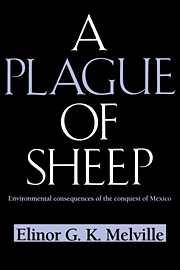Book contents
- Frontmatter
- Contents
- Illustrations and Tables
- Preface
- Chapter 1 Introduction
- Chapter 2 Alien Landscapes
- Chapter 3 The Australian Experience
- Chapter 4 The Mexican Case
- Chapter 5 The Conquest Process
- Chapter 6 The Colonial Regime
- Appendix A Sub-Areas
- Appendix B Population Estimates
- Appendix C Sources for Land Holding and Land Use
- Abbreviations
- Glossary
- Bibliography
- Index
Preface
Published online by Cambridge University Press: 05 August 2012
- Frontmatter
- Contents
- Illustrations and Tables
- Preface
- Chapter 1 Introduction
- Chapter 2 Alien Landscapes
- Chapter 3 The Australian Experience
- Chapter 4 The Mexican Case
- Chapter 5 The Conquest Process
- Chapter 6 The Colonial Regime
- Appendix A Sub-Areas
- Appendix B Population Estimates
- Appendix C Sources for Land Holding and Land Use
- Abbreviations
- Glossary
- Bibliography
- Index
Summary
This is a study of the environmental consequences of the European invasion of the New World. It uses the sixteenth-century history of the Valle del Mezquital, Mexico (1530–1600) as a case study and focuses on the changes associated with the introduction of Old World grazing animals into New World ecosystems. It attempts to show how the ecological and social changes associated with this process brought about the conquest and domination of territory.
The study builds on Alfred Crosby's insight that the conquest of the New World was as much a biological conquest as a political one, and involved the transformation of New World environments. But whereas Crosby is interested in the processes by which Europeans came to dominate the temperate latitudes, I am interested in the nature of the conquest in the tropics, where the indigenous populations have remained to shape landscapes, society, and culture. At first sight these “indigenous” landscapes appear to reflect a continuity of ecosystems, as well as culture and society. But this apparent continuity is misleading: the presence of chickens, pigs, donkeys, goats, sheep, cattle, horses, and mules are all evidence of an ecological revolution brought about by the European invasion, and while the persistence of Indian culture and society is remarkable, a profound shift in the modes of production from horticulture to some form of agro-pastoralism occurred in almost all parts of the New World as a result of the European invasion.
- Type
- Chapter
- Information
- A Plague of SheepEnvironmental Consequences of the Conquest of Mexico, pp. xi - xivPublisher: Cambridge University PressPrint publication year: 1994



